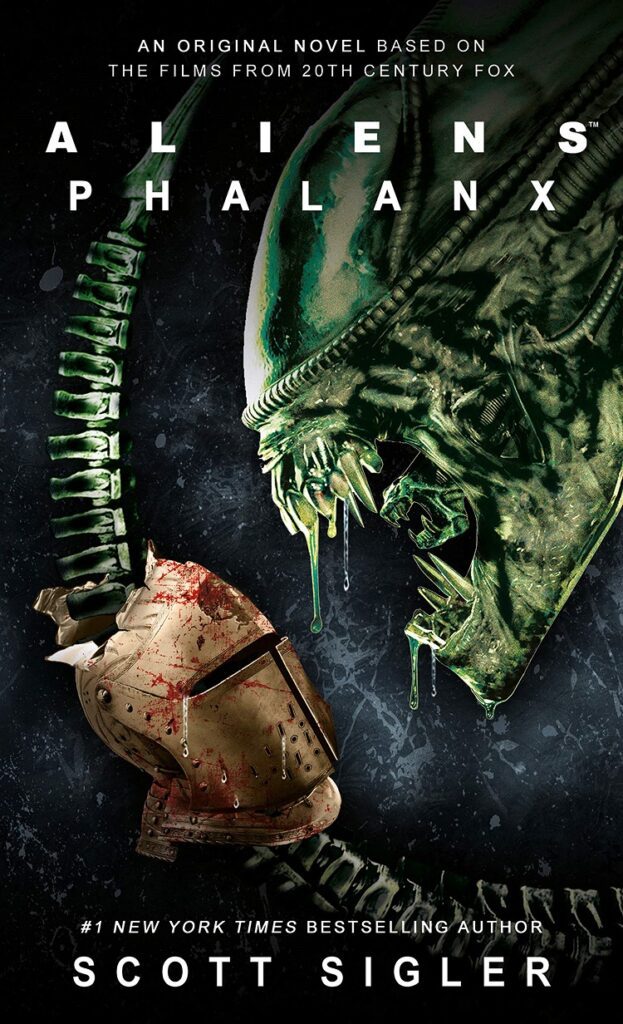
I’ve been riding the Alien train for the better part of 40 years now, and through the franchises high points and low, there’s often a reliance on the familiar. How many times is Ellen Ripley going to show up, or some other female protagonist? Or Weyland-Yutani, a.k.a, “The Company”? Will it be Colonial Marines this time or blue-collar scoundrels going to war with a retrofitted blowtorch and some IEDs? There’s a lot of sameyness in the universe, and while the thought of cruising through another Alien book was still interesting to me, I was prepared to sigh at repeated trope after repeated trope.
However, Aliens: Phalanx is something completely different. It’s set during a medieval period with castles where religion governs all. The aliens in this story are called “demons” and their queen, “The Demon Mother.” Preacher Ramirus is always encouraging the dwellers of mountainside hideaway Lemeth Hold to pray for salvation from the demons, that they may be rescued and able to return to the surface to live and thrive. Ramirus lends his authority and credibility to the Margrave, the head of the Council and leader of the hold, but is he truly a leader, or just seeking to control his people for his own agenda?
In this primitive time where everyone hides underground from the hunting demons, ambitious and fierce Ahiliyah Cooper, warrior progeny Brandun Barrow, and the clever but crass Creen Dinashin serve their hold as Runners, carrying trade goods between Lemeth Hold and other holds in the area, doing their best to retrieve needed goods and peddling their own while avoiding death every step of the way. Runners have to be agile, quiet, strong, and sneaky to avoid getting picked off by the demons, especially at night, less so during the day, but the demons’ behavior and hunting patterns have been changing. Ahiliyah notices this and reports her findings, but they fall on deaf ears. No one dares go up against the demons unless they seek a quick death. Silence is survival. Stay hidden at all costs.
Ahiliyah begins to wonder how long they can hide from the demons. Would the monstrosities not eventually devise a way to break through the traps and barriers protecting each of the holds where hundreds or thousands of people had been hiding for generations? Her determination to do something rather than wait around to die sets many things in motion but isn’t without consequences, all of which come to a head just as the world starts to violently unravel around them.
With respect to the author’s introduction request that early readers not spoil what happens or reveal any twists throughout the story, I can say that every character you meet in the story has a memorable arc and a purpose, even the more minor ones. This is not a pretty story where everything turns out okay for everyone in every situation — in addition to the demons, the people here are dealing with other medieval and human problems like disease, starvation, religious disagreements, and cultural clashes with other holds, not to mention those pesky Northerners across the sea. It all seems historically familiar, but does the story actually take place on Earth? The social trappings make it seem so, but the geography and “Three Sisters” in the sky at night could imply otherwise. If it is Earth, why does the area seem so unfamiliar; if it’s not Earth, how would a medieval civilization of humans appear there? How could a society no further developed than to use spears and crossbows possibly stand up to an entire thousands-strong hive of aliens and their queen? Read it and find out.
At over 500 pages, I wondered if there would be sections that padded the story or would make progress start to drag. There were not. As I read Aliens: Phalanx, I often thought what it would be like as a movie. Well, it would probably be over three hours long, and every scene matters, whether for character development or world building or explaining why some odd thing is the way it is, every word is a carefully placed brick in the road that leads up to a surprising finale that upends what both the reader and the characters know — or think they know — about the story. It is with that same care and attention to detail in mind that I was surprised to see at least three pivotal characters’ names misspelled (Liya, Brandon, and Zacharia) in the story, along with one or two other typos. It doesn’t detract from the overall quality of the story, but it was distracting as my eyes tripped on their way racing down the page to find out what would happen next.
Overall, I really enjoyed Phalanx and really have no worthwhile quibbles with it — it avoided almost all the usual tropes and built a fresh new world where access to conventional weapons and “nuking the site from orbit” aren’t even remotely possible. I suppose one could argue that Ahiliyah being a woman leans on a franchise stereotype, but the story didn’t play it up that way at all. She was a strong character in her own right, battling against sexism within her culture, inequality in what’s expected of her, and adversity in achieving even the smallest of her dreams. I really liked her, the tension within her team, her mutual envy traded with Brandun over warrior/Demon Killer status, and her unique talent for being one of the few people who could sling insults back as fast as Creen could dish them out. There are ups and downs, victories and lamentations as characters you’ve grown attached to perish in an instant. It can be a hard read at times because of that, but this is Aliens — we should be pretty used to it by now. If you’re a fan of the franchise and the antiquated premise sounds even remotely interesting, Aliens: Phalanx should not be missed.